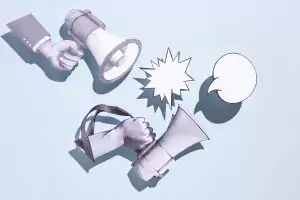
✅ AI Essay Writer ✅ AI Detector ✅ Plagchecker ✅ Paraphraser
✅ Summarizer ✅ Citation Generator
So far we’ve been talking only about some kind of abstract writing, since I’ve not given you any specifications about whether the techniques I described should be used in fiction or academic writing (fortunately for you, you can use them in both). Today I’d like to write about an exclusive feature of fiction writing: twists.
What is a twist? Imagine you are describing your character’s misfortunes in the forests of the Amazon, or which is even more intense, in a countryside mall. He (let’s call him John) just walks around the town, smiles at cute girls, and enjoys his life. One day, John decides to go to the local mall to buy some machetes and charcoal; he walks into the mall, turns right, and then bang, boom, aliens, explosions, teleportation, amnesia. Though John may be unaware of it, he has just got into a story twist—a turn of sudden events that affects the story in a short-term or a long-term perspective.
The most canonic twist of all times is, perhaps, a cinematography cliche, when the character’s best friend turns out to be working for the KGB, or something like that. This can have an immediate effect (say when the character reports his friend to the FBI, and the poor guy gets arrested), or some long-lasting consequences—for example, if this KGB friend escapes justice, kidnaps the main character’s wife, and threatens the world together with the main antagonist (by the way, another typical cliche is when the antagonist shoots the KGB friend).
“Why would I need to spoil my story like that?” you might ask me, and I would make a clever face and answer, “To add action and intrigue to your story.” Sometimes, a gradual development of a story is not what you need to maintain your readers’ interest in your novel. In this case, you need something thrilling to happen, something that will turn the whole story upside down, give it another perspective. What is even more important, sometimes twists can save you from a dead end—for example, when you realize you’ve led your character into a desperate situation with no way out. A sudden rescue (95% of the American B movies) or unexpected luck (Conan Doyle’s ”Engineer’s Thumb,” when one of the characters manages to be rescued due to pure luck) are good examples of such twists.
Twists can be small or big; they can affect the whole story, some of its chapters, or be just a momentary event. Anyway, do not neglect this technique in your narrative writing, as it will make it more unpredictable and engaging.
Follow us on Reddit for more insights and updates.




Comments (0)
Welcome to A*Help comments!
We’re all about debate and discussion at A*Help.
We value the diverse opinions of users, so you may find points of view that you don’t agree with. And that’s cool. However, there are certain things we’re not OK with: attempts to manipulate our data in any way, for example, or the posting of discriminative, offensive, hateful, or disparaging material.